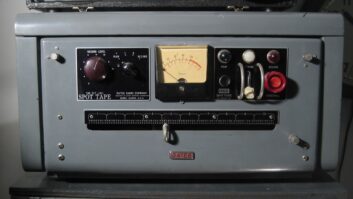
American jazz saxophonist Archie Shepp during an interview for Radio Vinyle at the Discothèque de Radio France. CREDIT: Radio France / Christophe Abramowitz
PARIS and LONDON — Despite increasing digital uptake and the fact that “analog radio” today merely refers to the modulation technique, since it is usually played out from a digital source, there are still a few “true” analog stations around.
In August 1877, Thomas Edison completed the first phonograph. Some 140 years later, many radio stations still spin vinyl from time to time, usually when an old-fashioned record is the only available source for that specific music. BBC and Radio France are among the few broadcasters, however, to still run a radio format based around vinyl records.
MUSICAL INSPIRATION
Radio Vinyle is an original concept developed by the Discothèque de Radio France (Radio France’ records library), in cooperation with Radio France’s France Inter. During each program, a guest artist is invited to visit the Discothèque, a warehouse located in the north of Paris where one can find about 450,000 vinyl records — one of the biggest collections of its kind in Europe.
The Discothèque team then pulls out a few musical gems from the collection specifically for the guest. While discovering this unique place, the invitee goes through certain album sleeves and conveys to the radio host his or her perception while listening to the music. The show takes place in the same Discotèque, leaving the guest immersed in his or her feelings and memories, resulting in an interesting storytelling experience.
Christilla Huillard-Kann, deputy director of New Media at Radio France, explains that this vinyl-only, no-CD show aims at bringing guests “back to childhood, memories, musical inspiration,” and that Radio France’s vast record collection provides the perfect backdrop for doing so.

Johnny Marr (L), British musician, singer, songwriter and guitarist of The Smiths with Pete Paphides. Radio Vinyle uses Technics SL1200 MKII turntables, the manufacture of which was discontinued in 2010. Each episode is broadcast on France Inter and also video-recorded for the station’s website. It is in addition possible to replay the program at radiovinyle.radiofrance.fr.
Another example is that of digital radio station BBC Radio 6 Music, which aired the program “Vinyl Revival,” presented by Pete Paphides from April 2011 to February 2013. Paphides, a music journalist and former chief rock critic for “The Times,” a daily national newspaper in the United Kingdom, has been collecting records since he was nine.
“I still remember when I bought my first record. I loved the atmosphere you could find at the music shop: I always walked out of the shop eager to return,” he said. “I loved buying records and listening to them. Later on, I became a music journalist, and I started getting records for free through the mail.”
PRO-EFFORT
It was almost like a dream come true, he says, but then he noticed that his love for music was starting to disappear — the easier it became to obtain music, the less he desired it.
“One year later, I went back to the record shop, and I realized my enthusiasm wasn’t the same,” he said. “Once you have physically walked into a record shop and bought a record, then you go home and play it. If you don’t like it the first time, you play it again, looking for something that attracts you. Sometimes you are not lucky, but often you will find some value in it.”
Paphides believes that the effort one puts into listening to a record — including going to the shop, making a selection, taking it out of the sleeve, looking at the sleeve — all contribute to what one actually loves about music. When these factors are eliminated, he explains, one loses interest. “Listening through Spotify, or downloading music via file sharing, makes everything too easy, preventing you from really enjoying what you are doing,” he said.

Pete Paphides (L) recording an episode of Vinyl Revival with British actor John Simm. When Paphides left The Times, he discussed with a producer his dream of making a radio show based around turntables and traditional cross faders in front of the host. Thus, “Vinyl Revival” was born. In each Vinyl Revival episode, which made use of two Technics SL1200 turntables, Paphides spun records from his own collection while interviewing the guest. “The first two series were very successful, and a third is expected later this year.” said Paphides.
“We had very good guests — they appeared happy to participate because it was a little different. They are used to answering questions about their personal life and habits, but during my show, we just talked about … records.” Paphides adds that, as you’d expect, when the guest artists talked about their own records, they ended up talking about their lives.
“We got some good interviews, and listened to some amazing music. I’m not anti-CD but I am pro-effort. Adding a bit of determination when one does something enhances the experience,” he said.
“I can remember pretty well what I was doing the day I bought every album. There is a story for each record you buy; it’s like an entry in your diary,” he said. “Now look at your iTunes folder — can you remember what were you doing on the day you downloaded each of those tracks?”
Davide Moro reports on the industry for Radio World from Bergamo, Italy.







